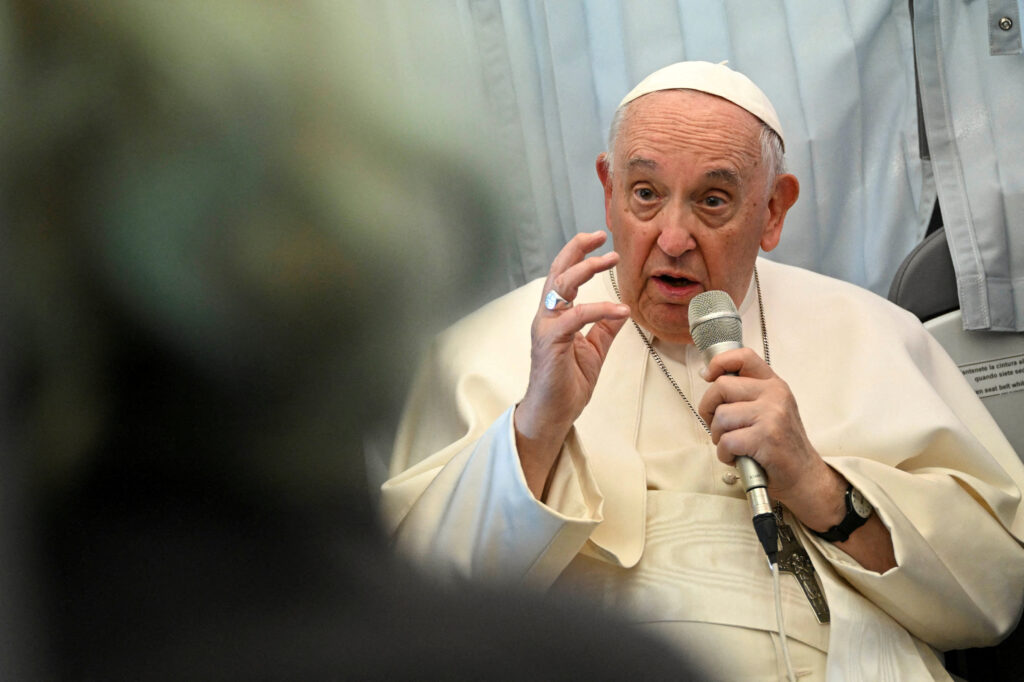
FILE PHOTO: Pope Francis holds a news conference as he returns to the Vatican following his apostolic journey to Hungary, aboard the plane, April 30, 2023. Vatican Media/Handout via REUTERS/File Photo
Vatican City, Holy See— Pope Francis opens the Synod of Bishops’ general assembly in Rome Wednesday, October 3, 2023, which, in a historic first, gives women a vote, after a vast global consultation on the future Catholic Church.
READ MORE: Pope Francis lets women vote at int’l meet of bishops
Here are five things to know about the event:
Input from faithful
Since 2021, the world’s 1.3 billion Catholics have been invited to express their views on the Catholic Church and its challenges to help guide the institution through the 21st century.
The “Synod on Synodality” was launched by Francis, 86, as a way to make the Church more inclusive and transparent as it sought input from the faithful around the world.
Insights from local dioceses were submitted to episcopal conferences, all contributing to a 50-page working document called the “Instrumentum Laboris” that will be used during the discussions that will take place over the next four weeks.
A second session of the assembly is scheduled for October 2024, after which a final document will be given to the pope. He will then decide whether or not to incorporate its findings into a papal document known as an apostolic exhortation.
“It’s an important forum for reflection for the Church, on its way of being, of moving forward,” Italian priest Giacomo Costa, the special secretary of this assembly, told AFP.
21st century issues
The current Synod is the first time the Vatican has waded into so many of today’s contentious social issues so openly.
The topics to be addressed include the place of LGBT+ people within the Church, whether women should be ordained deacons, and whether married men can serve as priests in regions with insufficient clergy, among others.
While there has been consensus on some issues, “there are other issues on which we disagree in substance,” said Costa.
Contributing to discussions will be theologians, experts and sociologists, he said.
Women and laypeople
The Synod is a consultative institution created by Pope Paul VI in 1965 that meets regularly through assemblies.
Francis presided over three previous Synods: those of the Family in 2014-2015, Youth in 2018 and Amazonia 2019 — where he rejected a proposal to open up the priesthood to married men in remote areas of the Amazon.
The current Synod marks a major break with the past, however, with Francis’ decision to allow women and lay people to vote.
“It’s a total change from Paul VI: this time, the people of God are being summoned, not representatives,” a Vatican observer told AFP.
The source said the lay men and women in the assembly will be trying to push past the “ecclesiastic culture” pervading the event.
“They won’t be satisfied with good words, there will be a demand for procedure, the will to change, efficiency,” said the source.
Busy calendar
For four weeks, the 464 participants, including 365 voting members, will meet every day, divided into 35 working groups divided into five languages (English, Italian, Spanish, French and Portuguese).
Among them are 54 women.
The Synod will open and close with a mass presided over by Francis in St Peter’s Basilica, and will be marked by periods of prayer.
Francis said last month that discussions during the assembly will be behind closed doors to “safeguard” the synodal climate.
Dissent
Although Francis has warned that there is “no room for ideology in the Synod”, there are likely to be differences.
Vatican observers will be closely watching the conservative wing of the Church, which is hostile to the Argentine pope.
Its members, which include Germany’s Cardinal Gerhard Mueller and US cardinal Raymond Burke, maintain that Francis risks creating confusion and division in the Church, given the Synod’s reflections on possible doctrinal changes on thorny issues such as gay rights or celibacy.
